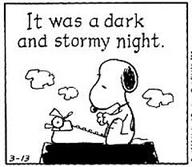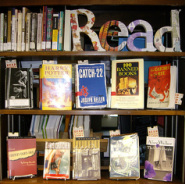So you want to be a writer
while maintaining your will to live.
It isn't easy, but it is possible.
Here's my advice.
(If you want to know more about my own writing process, it's here.)
1. Read.
|
And no, I don't mean you should spend all your time reading books about writing.
While there are many good books on craft, you can waste a lot of time reading about how to write instead of actually writing. To quote Admiral Ackbar: It's a trap. Just read lots of good books, in and out of your intended genre. Read classics. Read contemporary fiction. Read nonfiction. Read all over the place. Be promiscuous and reckless in your reading. |
2. Write.
|
If you don't write, you're not a writer. A writer is someone who writes. It's that simple. And that hard.
Use the right tool for the job.
|
3. Gather a Team.
|
It turns out that writing is a team sport. I know, right? Who knew?
You'll need:
|
4. Be Totally, Definitively Sure You Want to be Published.
|
There is a world of difference between writing for yourself and writing for publication. Frankly, I don't recommend writing as a profession. It's very difficult to get published, to say nothing of actually making a living. If you can write for your own edification, and do anything else to make a living, do the other thing.
Right, then. Onward. |
5. Rejection is Inevitable. No, really. It is.
|
After I wrote (and rewrote) my first novel, it took me a full year to get an agent, and four years after that to get my book deal. I wrote my second novel while collecting rejections for my first. It was worth the wait: I love my editor and publisher. But the wait? Brutal. Bru. Tal.
In those years, when people would ask my young son, "What does your mommy do?" He would answer, with all the seriousness of an earnest three-year-old, "She gets rejection letters in the mail." But you're all That's not going to be me. I'm more talented than you. Awesome. Maybe work on your humility? Even if, on your very first try, you get an agent, and a great book deal, and a sweet movie option, you will still get rejected. You might get dropped by your publisher. Critics might pan the movie and the book it's based on. Maybe bookstores won't keep your book in stock. Or a writer with your exact same idea stays on the New York Times Best Seller list for a year longer than you do. It's gonna happen. It is an inevitability. And so I give you my method for surviving rejection:
|
6. Back it Up.
|
Story time!
A long time ago in a galaxy far, far away... An author lost three-quarters of a novel (which was freaking fantastic, by the way) AND the memoir from her year in Australia because her MacBook crashed. RIP hard drive. RIP novel. RIP memoir. Did this author know she should have been backing up? Of course she did. But she had moved hemispheres, and houses, and was traveling a lot, and just hadn't remembered to plug in an external hard drive. Blah blah excuse excuse. This, ahem, anonymous writer does not want others to experience her hellish nightmare. Writing is torturous enough. Losing your work is rubbing lemon juice into your paper cuts. And so you must back up your work.
|
7. Be Happy.
|
Living your life as a miserable, misunderstood writing genius may seem romantic and artsy, but nope. It's just miserable.
You can be a good writer and be happy. But it takes work. You must be intentional about it. Be kind to your family. Be good to yourself. Balance your work with lots of play. If you are not happy, find a way to become so. Get help. Reach out. There is no honor in needless suffering. Then, from your balanced, healthy platform: take care and take risks. A full and interesting life makes for full and interesting stories. No, fiction isn’t autobiography. But you do need to know something about love, risk, and human nature in order to write things worth reading. Be brave enough to enjoy your life. |
Good luck!
Keep writing!
And...
Keep writing!
And...








